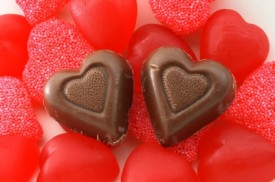
As mid-February rolls around, two subjects, hand in hand, start winding their way into our societal consciousness. Like it or not, you probably have two items “on the brain” these days: love and chocolate.
Now, I sincerely hope you have an affinity for love. Likewise, probability indicates that you most likely have an affinity for chocolate. But what is it about chocolate that has all of us running to the store on Valentine’s Day to procure those shiny red boxes for our loved ones?
Consider the sensations that love creates in the brain. When we are in love, what do we feel? What are the elemental feelings and emotions that a true, heart-felt loving relationship create? Think about the sensations associated with a budding romantic bond; being with that other person creates feelings of well-being and centeredness. We feel stimulated and awake in their presence, aware of their every word and move. We feel pleasure just being in the same room with them.
Now, consider chocolate. As it turns out, there are an extensive number of compounds in chocolate – about 380 – a number of which can have profound effects on our brain chemistry and contribute to these same feelings and sensations that accompany courtship and love.
Imagine that you have just received that delightful box from your loved one. You lift off the flimsy, red cardboard top, slip off that sheet of paper, and within you find a dozen small brown paper cups, each gently holding one of these delicious trifles. You pick the darkest one in the box and pop it in your mouth. Then what happens?
As you chew, savor and swallow, your body begins to digest and metabolize those 300+ compounds. Here are a few of them and their effects:
- Tryptophan and serotonin: They create feelings of relaxation and well-being.
- Caffeine: This psychoactive substance creates temporary alertness.
- Xanthines: This mild stimulant occurs naturally in the brain and, like caffeine, increases wakefulness.
- Theobromine: This stimulant and vasodilator increases blood flow.
- Phenylethylamine: This compound stimulates the brain to release dopamine, a neurotransmitter associated with feelings of pleasure and motivation.
- Anandamide: This neurotransmitter activates pleasure receptors in the brain.
- Flavonols: Found also in foods like red wine, blueberries and green tea, these compounds boost blood flow to key areas of the brain for two to three hours after being metabolized, creating effects similar to those of a mild analgesic (painkiller) like aspirin. [1]
While a great number of researchers continue to unravel the details of how the compounds in chocolate affect brain chemistry, in reading this list, the simple question that comes to my mind is this:
If you were in a courtship situation, wouldn’t you take actions to engender these same sensations in your prospective mate? If in having the object of your desires consume a cocoa-based gift you can create associations within their mind connecting you with feelings of stimulation, pleasure, wakefulness, relaxation, well-being and even relief of pain, doesn’t that bode well for the development of love?
To be accurate, many of these compounds must be metabolized in large quantities to create noticeable effects. For example, Christian Felder of the National Institute of Mental Health estimates that a 130-pound person would have to eat 25 pounds of chocolate at one time to experience an intoxicating effect. [ii] (Please, no matter how tempted you might be, don’t try this at home.)
Of course, in the end, we cannot ignore the simple sensations of eating chocolate that make it such a widely-loved experience. Researcher Daniele Piomelli, in his studies of chocolate, speculates that the ingredients, smells, tastes and textures of chocolate alone can be enough to induce feelings of pleasure. [iii]
So with those thoughts in your brain, make it a wonderful Valentine’s Day.
For additional reading, check out:
- Brain Cannabinoids in Chocolate (published in Nature, August 22, 1996)
- Why Women Need Chocolate by Debra Waterhouse (1995)
- Your Brain on Chocolate on the Harvard Health Blog (2017)
[i] ”Boosting Brain Power – With Chocolate,” Science Daily (2007, February 22).
[ii] Ellen Kuwana, Discovering the Sweet Mysteries of Chocolate Neuroscience for Kids (2010, October 1).
[iii] Ciampa, Linda. "Researchers say chocolate triggers feel-good chemicals," CNN (1996).
My Favorite Chocolate: TCHO

